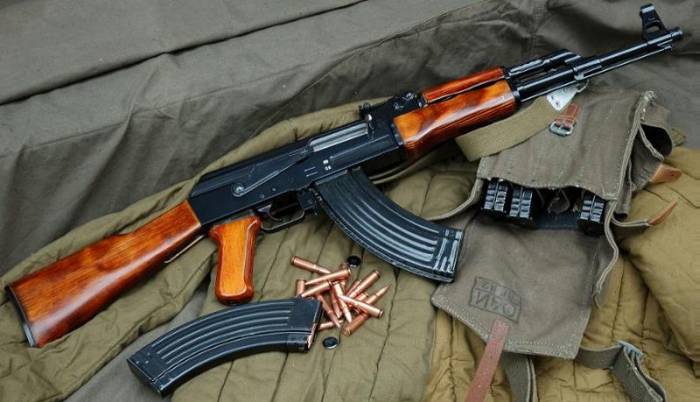“The laws are very strict and the practice is very-very leisure and very easy. Everyone was wondering how could it be that Germany has one of the strictest laws and always, depending on the ranking, is number three, in small arms is even number two of the biggest world arms trades and weapon producers? So, where’s the gap?” lawyer Holger Rothbauer told the Germany-based investigative journalism team Redfish.
Rothbauer represents a whistleblower who worked with Heckler & Koch and spilled the beans on shady arms deals the company has made. Back in 2009, he reached Jürgen Grässlin, a German publicist and peace activist who has been waging his own war on the silent arms sales for years. This May, the case based on the whistleblower’s revelations made it to court, with six former H&K employees in the dock.
The indictment focuses on 4,500 G36 assault rifles and other firearms that were sold in 16 batches to Mexico, despite the overwhelming level of drug-related violence in the country. The guns in question were used in the infamous militia attack on Mexican students in Iguala in 2014. Six students were killed in the assault and 43 were kidnapped, vanishing without a trace.
Obtaining arms export licenses, while extremely difficult in theory, proves to be way easier when corporations cozy up with politicians. The lobbyists receive large, yet untraceable donations, pushing through all the permissions needed to sell weapons to virtually anyone who’s buying, the documentary says.
“There are several ways through which the arms industry influences politics. For instance, the SPD politician Johannes Kaas in 2005 received – via his district chapter – some 60-80 thousand euros in small donations. They were split up in such small amounts that he didn’t have to declare them,” German MP from the Left Party, Anita Scheller, told Redfish.
If an application fails despite the lobbyists’ efforts, an arms manufacturer can appeal it with the so-called Security Council, consisting of senior cabinet ministers and presided by the Federal Chancellor. The council meets in secrecy and can decide singlehandedly whether to approve the export bid. Such a scheme gives “virtually no control” over the arms sales to German society, Rothbauer said.
Policy of silence
Blowing the whistle on the shady arms deals comes at a heavy price. The whistleblower behind the Mexico rifles scandal has essentially had his life ruined. He lost his family, his job and was forced to leave Germany, according to his lawyer. However, it was not positively established that the threats against whistleblower came from H&K.
“You can say anything in Germany, as long as you don’t attack the government for illegally selling weapons,” Grässlin said.
Delving into the German arms industries’ dirty secrets can come at an even heavier price, since “accidents” can happen to the whistleblowers and people are genuinely terrified to speak out, Grässlin claimed.
“In Germany, they don’t shoot you in your head. In Germany they do it with a tragic accident of a citizen ‘who had a car accident,’” he said.
The Redfish team travelled to the town of Oberndorf, where the H&K headquarters is located. The team was promptly “greeted” by the police, who urged them to stop filming. Locals were also reluctant to speak. One woman, who preferred to stay anonymous, explained that people were not talkative since the corporation has “really long arms.”
The team then tried to get in touch with the Heckler & Koch at an arms expo in France, yet they did not receive a warm welcome. One H&K employee shoved one of the crew and then went into defense mode, simply ignoring any attempts to get a comment from them. Eventually, one of the top executives of the company agreed to talk to the journalists – sadly, strictly off the record.
Dodging responsibilities by moving production out of Germany
Another major German arms producer, the Rheinmetall Corporation, has seemingly dodged German laws in a simpler way, moving its factories to other countries with more lax weapon export rules. A subsidiary of Rheinmetall conglomerate, RWM Italia, came into the media spotlight following a Saudi-led coalition bombing run on October 8, 2018. It emerged the munition, which killed a family of six, including four children, was made at RWM Italia’s factory in Sardinia.
The scheme used by Rheinmetall provides even less accountability since Berlin can shift the blame on Italy, where the factory is located, while Rome can point fingers back, stating it’s actually owned by the Germans, the Redfish said.
The fragments of the bomb, namely a suspension lug to hold the bomb in place in an aircraft, were recovered at the site of the airstrike by the Yemen-based Mwatana Organization for Human Rights. The humanitarian group filed a lawsuit against Rheinmetall’s subsidiary in cooperation with the Berlin-based European Center for Constitutional and Human Rights (ECCHR) and the Italian Rete Italiana per il Disarmo.
Read the original article on RT.
More about: Germany
















































